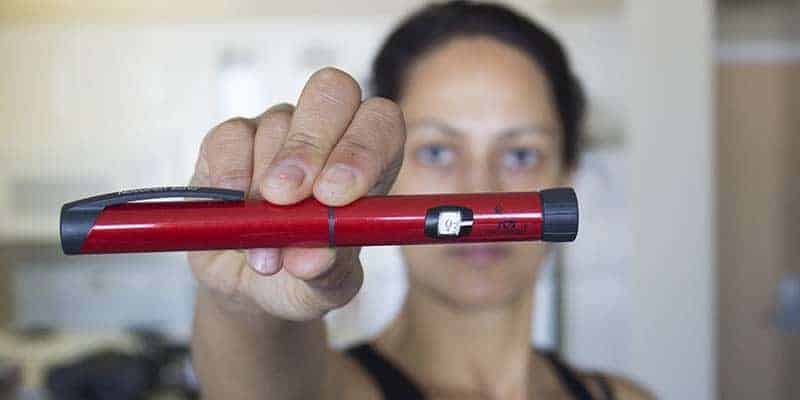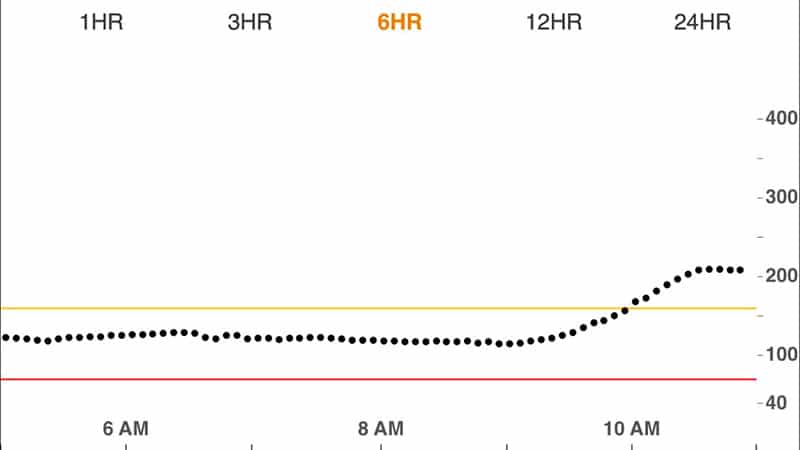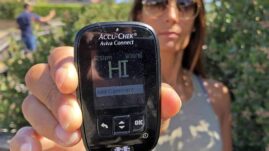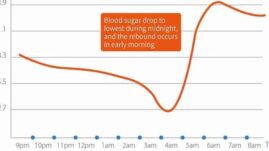We’ve all been there before.
You wake up. Lay in bed for a few minutes before getting up. Check your blood sugar. 115 (6.3 mmol/L) stares back at you.
You smile to yourself: life is good.
Forty minutes later, when you sit down to eat, your blood sugar meter or CGM tells you that you are now at 180 (10 mmol/L)! You have eaten NOTHING. All you’ve done is prepare for the day and prepare food. Now you face the grim potential of chasing your high blood sugars all day long.
What is going on??
Let me explain why your blood sugar sometimes can be high in the morning and what you can do about it
This isn’t Dawn Phenomenon
Many people would blame this rise in blood sugar on dawn phenomenon (DP), which has a similar endpoint, but a different mechanism. Dawn phenomenon is the result of hormones releasing in the body in the early morning – predominantly growth hormone, cortisol, epinephrine, and glucagon – which in turn increase insulin resistance. The current basal insulin from the pump or long-acting injections is no longer enough, and blood sugars rise.
That hormonal surge happens around 2 am-6 am, with most of it occurring in the middle of the night. Let’s say you woke up at 7:30 am and aren’t in the “DP zone.” It’s not DP. Then what?
Feet on the floor
The moment your feet touch the floor as you roll out of bed, you signal to your body, “Hey, I need energy for all the stuff I’m about to do!” Your body recognizes you haven’t eaten in many hours. Your body is also lazy smart and wants the most easily accessible source of energy: the liver.
The liver is the Wal-Mart for stored energy since it’s got everything you need. It stores glycogen that can be easily broken down when fasted or needed for activity, AND is the home of gluconeogenesis, a process where protein is broken down to glucose for energy.
Guess what? You’re fasted AND about to move, which is activity. So, your liver decides to dump glucose into the bloodstream. It will also break down some protein to glucose, but to a much lesser extent.
The cells take up the glucose as much as they can, but you may still be insulin resistant from the night before and from the cortisol dump that occurs each day around 7 am (hence why you may need a greater amount of insulin at breakfast than other meals. Food for thought.)
BAM! Blood glucose levels begin to rise similarly to an amusement park ride – it starts gradually and suddenly gets quicker and quicker. Those of you with CGM may see this.
How to prevent high morning blood sugar
Do not fret, friends. There are ways to deal. Here are three simple ways:
1) Take insulin right when you wake up
If it’s 2 pm and you notice your blood sugar is shooting up for no apparent reason, you’d take a correction dose of insulin to prevent that spike, right? (Well, I’d hope so).
The same concept applies here.
To determine how much insulin to take, wake up, record blood sugar values at 30 and 60-minute intervals, and record this for a few days (or use CGM data if you have it). Then, you can use your insulin to carb ratio to determine a correction bolus.
2) Increase your basal rate around your wake up time
If you fight Dawn Phenomenon, what’s a common strategy for success? Increasing basal rates in the wee hours of the morning to counteract that hormone-induced spike.
Well, if you’re used to a particular morning routine and know it’ll take you a little while to prepare food and eat, consider increasing that basal rate during that time period. That additional insulin may overcome the liver dumping glucose and blunt your blood sugar spike, or ideally, prevent it in the first place.
3) If you skip breakfast, stop skipping it and EAT SOMETHING
As a registered dietitian, I can regurgitate all the information from the Academy of Nutrition and Dietetics about why breakfast is important. This isn’t about that, but in all honesty here, try eating SOMETHING. I’d love if it were healthy, but if you’re just DYING to have Cinnamon Toast Crunch, by all means, have at it. If you’re about the low-carb life, go for some eggs.
This should, feasibly, prevent an even further increase in blood sugar had you not eaten anything at all and just went about your day.
Pop Quiz: What do these have in common?
If you answered insulin administration, you win!
Insulin, through more biochemistry magic, shuts off the liver glucose output, whether it comes from glycogen breakdown or gluconeogenesis. Thus, the spike should be halted in its tracks. YAY!
Bonus: Just add water!
Let’s pretend you decide to make some Gatorade from powder. It says to add 1 cup of water and mix thoroughly, so you do. You taste it, and it’s WAY too strong and concentrated. You add more water, mix, and now it’s delicious.
SAME THING WITH YOUR BODY.
You wake up in a state of dehydration because you haven’t consumed fluids in hours. Thus, the sugar in your circulation is more concentrated. Even if you wake up to a nice blood sugar, it’s quite possible the liver dump can have an even more accelerated effect because of this, so drinking a glass of water early (or even in bed) may help with this too.
(Also, most people don’t drink enough water each day, so it’s an easy way to sneak some more in)
These strategies should help you get your morning off to a better start, combat those pesky high morning blood sugars, and not allow diabetes to interfere with your plans!
Suggested next posts:
- Diabetes and Sleep Problems: Causes and Treatment Options
- Diabetes and Polyphagia (Excessive Hunger)
If you found this guide to avoiding high morning blood sugars useful, please sign up for our newsletter (and get a free chapter from the Fit With Diabetes eBook) using the form below. We send out a weekly newsletter with the latest posts and recipes from Diabetes Strong.






‘Wanacure
Glycogenesis is not just combustion of protein, but stored lipids as well. When bears hibernate they burn fat to stay alive via glycogenesis. Isn’t this how the Atkins/ketogenic diet works? Aren’t ketones in the blood and urine from a ketogenic diet indicative that the diet is working? You’re burning off the potentially dangerous harmful fats. Ketones from extremely high blood sugars are a different matter and need immediate medical attention. No?
I had a difficult time reading your article due to intrusive ads.
Christel Oerum
Thank you so much for your comment! What we believe you are referring to is gluconeogenesis (protein breakdown) as well as lipolysis (fat breakdown); glycogenesis is the process in which glycogen is formed in the liver and muscles from glucose as a glucose store. Ketones in both the ketogenic diet as well as from DKA are the same ketone bodies; the context in which they appear is different and that is what separates them from being a byproduct of lipid metabolism vs dangerous.
Harris
I get the same spike, gets worse once I hit the road in my car. The more mad I get a drivers the more it goes up. This only happens during work days. On the weekend it doesn’t do this. I’m not taking insulin cause it cause my numbers to also drop fast, sometimes down to 60. How do I keep the morning spike from happening?
Christel Oerum
I would suggest you find ways to mitigate your stress levels, drink plenty of water, if you manage with insulin adjust your insulin, and keep your carb intake to a level that works for you (I recommend working with an RD to find what meal composition works best for you)
Carla
Im pregnant and was diagnosed with glucose diabetes. When tested first thing in the morning my reading was in the 90s. And under 130 throughout the day ( for breakfast, lunch, and dinner) but being that first fasting test wasn’t under the 90s they started me on insulin. My first fasting is still in the 90s even on insulin. Im eating right and exercising. What else can i do to get that first fasting normal. Im very frustrated and disappointed in myself.
Christel Oerum
I suggest you discuss a few things with your doctor;
1st, what is your blood sugar goal? Your doctor might think you’re doing great
2nd, should you add some light exercise to your day (discuss how much and what type of activity you can add to your day – such as walking, swimming, etc.)
3rd, discuss adjusting your insulin if your blood sugars need to come down further
Those are a few things, but since you’re pregnant, you have to have the discussion with your doctor
Denise Pangaldi
Hi. My name is Denise. I just subscribed to your Newsletter. Loving it! Some of the things you talk about I have never been told about. I’m a T1D for 18 yrs. I wear an OmniPod but I’m going off of it. Insurance does not cover it and I’ve had several malfunctions which have been very scary. I would like to know what is the best long acting insulin from your opinion? I had used the Tresiba flex pen which was great. I’m also interested in the InPen smart pen. Never heard of that before as well. If you can give me more information on it would be greatly appreciated! Thank you
Christel Oerum
Thank you, and welcome to Diabetes Strong. I personally like Levemir but have also used Tresiba in the past and have been fairly happy with that as well. I’d suggest you focus on the duration of the different long-acting insulins and decide on one based on that. For example, if you don’t always want to take it at exactly the same time, a 42-hour duration insulin (Tresiba) might be best for you or if you want to make frequent changes Levemir or Lantus might be good. You can read more about insulin duration here: https://diabetesstrong.com/insulin-types/
Victoria
Absolutely love your website and all your helpful tips!
Md. Mesbauddin
I am a diabetic patient for about 7 years. For the last few years, I am suffering from morning sugar levels. For that, I read this article and gather a huge knowledge from here. I thank the writer for his valuable article.
Zakir fida
Hy .my fasting blood sugar are always around 135 to 145 .and random blood sugar level between 150 to 160 so how can I lower my fasting blood sugar please guide me
Christel Oerum
This post explains prediabetes and what you can do to lower your blood sugars: https://diabetesstrong.com/prediabetes/
Rose Rivera
I to have horrible spikes in the morning.Yesterday I awoke at 5am, my BS was 298 within 30min it was 350 and I had not eaten since 5pm the night before. This was scary. Dr says he dosen’t know why.I got switched from Humolog R and NPH to Humolog 75/35 and Lispro. The problem persist. Your explanation was great. Rose Rivera
Melissa
Hello!
My 10 yr old daughter was just dx this past June. Lower carb seems to work well for her bc she runs on the higher side. Any breakfast recipes for kids? She’s getting tired of eggs & protein pancakes. We stay away from cereal bc she spikes!
Ty!
Christel Oerum
We have 40 recipes in our recipe library, so hopefully, you can find something there: https://diabetesstrong.com/recipes/
Other options are yogurt, I like the plain greek yogurt with stevia or fruit/nuts or low carb cereal (https://diabetesstrong.com/best-breakfast-cereals-diabetics/), I just recently found a brand called Catalina Crunch (at Wholefood) that’s really excellent
Kev
I’ve been diagnosed diabetic for about 25y and have just got my cgm in the last month. Sites like this are helping me self analyse and iron out the rollercoaster that is my blood sugar levels.. thanks a million
Christel Oerum
So glad we can be of help. And congrats on your new device
Nadia
Hello!
I can’t even tell you how happy I was to find this post. More for clarification to myself that the morning spike is in fact normal, as it’s always bugged me! I use a CGM so seeing my blood sugars steady throughout the night is literally a god send, but as said above.. I’d check it within 30 mins of waking and it’s spiked! In the end I figured out taking a couple extra units when I wake up keeps me steady for the rest of the day. Knowing its a common issue and I’m not going crazy is great news! Haha
Christel Oerum
You’re definitely not alone in this, and 100% not crazy. Glad it helped and you figured it out